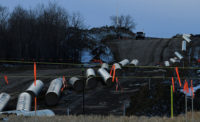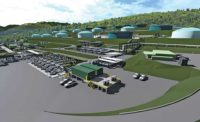Burnaby Opposition Mounts For Trans Mountain Pipeline
Canada's National Energy Board is evaluating Kinder Morgan's application to expand its Trans Mountain pipeline, but Burnaby, British Columbia, has asked that the environmental permitting and review process-meant to set the stage for the $5.4-billion project-be scrapped completely because of the recent appointment of Steven Kelly, a former Kinder consultant, to the NEB.
As a consultant for IHS Global Ltd. in 2013, Kelly submitted an economic report on behalf of Kinder Morgan that said the proposed expansion would generate $36 billion in revenue for Canadian crude producers by 2037 and help domestic supply to reach lucrative refinery markets in Asia.
Kinder wants to expand the 1,150- kilometer existing pipeline, originally completed in 1953, by looping it from a site near Edmonton, Alberta, to Burnaby. If approved, it would create a twinned pipeline that would increase the capacity of the system to 890,000 barrels per day from 300,000 bpd of bitumen, crude oil and refined products. NEB recently postponed a September public hearing on the application.
Burnaby has stymied, both politically and geologically, Trans Mountain for years. Instead of looping the pipeline through its existing right-of-way, the operator proposes to perform a directional drill operation through Burnaby Mountain, a greenfield nature preserve, says Gregory McCade, Burnaby city attorney.
An errant excavator in 2007 ruptured the pipeline near Burnaby, spilling 250,000 liters of crude oil. Kinder Morgan and the NEB generated more ill feelings last November, when the operator made test bores. Opponents claimed environmental restrictions were supposed to protect the area from development. McCade wonders "whether the National Energy Board has the authority to supersede Canada's environmental restrictions."
Critics claim that only Kinder Morgan will enjoy the project's financial benefits since the operator makes money by transporting oil, regardless of its price. David Ellis, a British Columbia-based pipeline activist, fears the pipeline would be built through a seismically active zone. "The people of British Columbia do not want this pipeline. If it breaks from an earthquake, it goes into the Fraser River and kills all our salmon. Our fisheries are a major part of our economy. We can't put some of our industries in danger by favoring others," he says.
The operator says there is no need for a new application. "The board's decision to strike Mr. Kelly's evidence and take measures to make certain he will have no contact with the members of the panel involved in hearing Trans Mountain's application is more than reasonable and goes over and above what would be required of an expert tribunal to ensure the record is untainted," Kinder Morgan stated in an August letter to the NEB.
"No conflict of interest exists," NEB spokeswoman Tara O'Donovan told ENR. "The hearing panel took appropriate action to address the appointment by striking the evidence prepared by Mr. Kelly from the hearing record. The NEB holds all regulated companies accountable for the safe operation of their pipelines."
McCade said striking Kelly's report from the evidence was an admission there was a conflict of interest. "There is no doubt the NEB plans to approve this project," he says.
The pipeline's ultimate approval could depend upon Canada's October election results, however. McCade says the National Democratic Party could win a majority in the House of Commons and stringently enforce environmental regulations. That would reverse the laissez faire approach of Canadian Prime Minister Stephen Harper's Conservative Party, he says.


